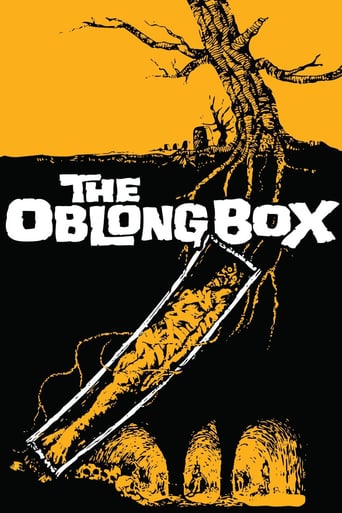a_chinn
This was going to be the fourth film directed by Michael Reeves ("Witchfinder General," "The Sorcerers," "She Beast"), who's a filmmaker I'm fascinated by, mostly because of the three intriguing horror films he directed before his untimely death. None of these films were horror classics, but they were unique stories and were more of an edge than most horror films of this era. I was particularly taken with "Witchfinder General" where Vincent Price gave a rare non-hammy performance and was terrific. "The Oblong Box" would have again paired Price and Reeves, but sadly Reeves died due to an accidental overdose during pre-production. Veteran horror director Gordon Hessler took over and made the film more in line with the previous AIP Poe film adaptations, which isn't a bad thing, but it's disappointing to not see what Reeves would have brought to this cycle of films. In this Poe tale, Vincent Price's brother, Alister Williamson, is buried alive, and then reappears wearing a red mask, exacting his bloody revenge. Overall, this film is not as classy or smart as the Roger Corman Poe films, but it's entertaining none-the-less.
utgard14
Po' (or poor, if you prefer) horror movie from AIP that has next to nothing in common with the Edgar Allan Poe story from which it gets its title. Arguably the least of the many Poe-inspired films that starred Vincent Price, although this has its share of fans. For his part, Price does fine here but the movie is just so dull there's nothing he can do to save it. The same can be said for the great Christopher Lee, who is wasted here in a small role. Most of the movie is spent focused on Price's character's disfigured brother, played by Aleister Williamson. We don't see his disfigurement until the end and, even then, it's nothing to get worked up about. Obviously die-hard fans of Price and Lee will want to cross this off their list, but be prepared this isn't among the best films of either man.
jdsuggs
Edgar Allan Poe wrote an essay called "The Importance of the Single Effect in a Prose Tale". He believed in maintaining one mood and seeking one effect in prose designed to be read in an hour. If this 1969 British film had shared anything more than a title with Poe's 1844 short story (which takes place on a ship), it might have benefited from fewer characters, fewer incidents, less back story, and as a result, less diffusion of that single effect that a good horror story strives for.This is a well-crafted film, good looking and enjoyable. Vincent Price is always a treat. There's just too much going on with too many characters, none of whom are really given the chance to take hold with us or resonate.The best sequence involves the man in the red hood (around whom the story attempts to revolve) being bullied into a crazily debauched pub, with interesting results, but even here, we don't have enough time to develop any real emotional color. Things just keep happening as the plot hurtles forward from place to place and character to character. The three leads share very little screen time and relate to each other minimally.The long, rambling plot synopsis for this film on Wikipedia makes for a pretty good exercise in trouble-spotting, and the fact that I felt the need to seek it out after viewing simply underscores the point. A bit less might have given us room for a lot more.I'm sure I'll give "The Oblong Box" another try in a few years- it's far from a waste of time. But as of now it doesn't crack my top ten Vincent Price movies in which someone is buried alive.
Scott LeBrun
Edward Markham (Alister Williamson) is disfigured in Africa by vengeful natives; when he and his brother Julian (Vincent Price) return to London, Julian keeps Edward locked up. Edward escapes by faking his death, but in a twisted turn of events, his "dead" body is unearthed and taken to unscrupulous doctor Newhartt (Sir Christopher Lee). Donning a crimson mask to hide his visage, Edward goes about seeking his own revenge, occasionally slitting some unfortunate persons' throat, while demanding that Newhartt keep him hidden.Based on a story by Edgar Allan Poe, this is certainly a decent horror flick, but it doesn't carry as much weight as one might like. The screenplay (credited to Lawrence Huntington, with additional dialogue written by Christopher Wicking and an uncredited Michael Reeves) is entertaining, but the film feels rather familiar overall. It's nicely made, with some fine period recreation. The opening is very striking, and there are restrained doses of blood, and provocative costumes on some of the ladies.Price is solid as usual, but it's the Sir Christopher Lee portions of the story that worked more strongly for this viewer, with an interesting relationship developing between the crazed Edward and the "good" doctor. The supporting cast does some very fine work. Rupert Davies is a delight as an artist, as is Peter Arne as the sleazy lawyer Trench. Maxwell Shaw, Carl Rigg, Harry Baird, Godfrey James, and Ivor Dean likewise impress. Uta Levka, Sally Geeson, and Hilary Heath are all absolutely lovely.Producer / director Gordon Hessler and company are wise to keep Edwards' supposedly hideous face hidden until the very end, but when we do finally see it, the makeup effects are underwhelming and the result is disappointment.Fans of Price and Sir Christopher will want to see it for sure; they reunited the same year for "Scream and Scream Again", but after that, wouldn't work together again until "House of Long Shadows" in 1983.Six out of 10.







